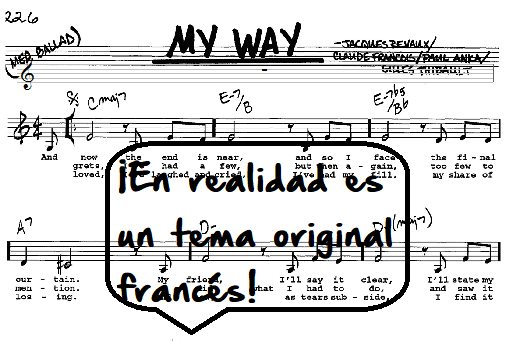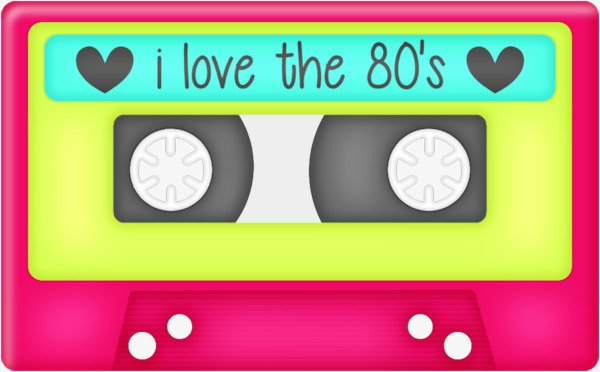¿Cuantas veces nos hemos llevado una sorpresa al descubrir el autor de una de nuestras canciones favoritas? Una vez seleccionado el tema que vamos a abordar lo primero que debemos de investigar es indudablemente quien lo escribió y si es posible encontrar toda la información relativa al mismo. Reconocer a los creadores de la canción es fundamental, una cuestión de honra y respeto que inmediatamente nos abrirá las puertas a ésa historia que estamos narrando con nuestra voz.
El siguiente paso es escuchar la canción original grabada. Si es posible en el idioma original. Luego buscaremos otras versiones realizadas por artistas reconocidos, seguramente con diferentes arreglos. ¿Y por qué no? Covers de buena calidad que podamos apreciar. Entonces seleccionaremos el de nuestra preferencia, para así escucharlo innumerables veces.
“Comme d’habitude” es en realidad original de Claude François, posteriormente versionada por Frank Sinatra cómo uno de los covers más exitosos: "My Way"

3. Análisis del texto. Palabras desconocidas.
Ahora pasaremos a hacer una lectura de comprensión del texto. Leer entre líneas, encontrar el significado del mismo y su contexto es muy importante. Muchas veces desconocemos por completo de que se trata la canción que estamos cantando y muchas de las palabras que contiene.
4. Coherencia emocional entre el intérprete y el texto.
Cómo decía anteriormente, una vez comprendido el texto del tema de estudio, se levanta un puente o bien nace el dialogo entre el compositor y el intérprete. Un buen cantante debe saber a su vez interpretar y expresar la carga emocional al público. Cuando eso ocurre, llega una respuesta inmediata… el aplauso. Es importante saber estar a la altura de un tema musical (emocionalmente hablando), si no estamos preparados, es preferible pasar a otro tema.
 Édith Piaf una de las más grandes interpretes francesas
Édith Piaf una de las más grandes interpretes francesas
5. La transcripción manual cómo técnica de memorización.
Hoy en día, con el uso de los teléfonos inteligentes, rara vez copiamos o transcribimos una nota, y menos un texto, manualmente. Sin embargo, ésta sigue siendo una de las viejas técnicas que deberíamos de retomar. Pues es casi infalible sobre todo para los que tienen memoria fotográfica, cómo en mi caso. Muchas veces le doy a mis alumnos lápiz y papel para escribir, recordar y memorizar párrafos de sus temas. Y si lo hacemos escuchando y deteniendo la música, cómo lo hacíamos en los 80’s cuando nos gustaba un tema en la radio, pues mucho mejor. Se los aseguro.
6. Tararear la melodía.
¡Sí! Cómo lo lees, tararear o canturrear la línea melódica. Poco a poco iremos memorizando el tema de estudio que llevaremos en nuestro subconsciente por un buen tiempo… A éste punto también empezaremos a cantar desde la mímica, esto nos ayuda a “visualizar” nuestra vocalidad (sonido, timbre y forma), por así decirlo.
7. Pista instrumental, Karaoke
Finalmente llegamos al último paso que es cuando ya estamos listos para cantar el tema seleccionado. Si tocas algún instrumento, genial, y sino acudimos a los recursos disponibles y pues cantamos con una buena pista instrumental o un karaoke adecuado a nuestro tono. Muchas personas hacen todo el proceso de aprendizaje al revés y empiezan por éste último paso. En mi opinión es un error, porque es más difícil corregir que aprender desde cero. También recomiendo grabar y escucharse. Ayuda mucho en la autoevaluación.
Nota: Una semana debería de ser más que suficiente para memorizar y aprenderse una canción, sin embargo, eso depende de cada persona. Además, preparar un tema en su totalidad, me refiero a la interpretación emocional que conlleva, la expresión escénica y estilo vocal apropiado, requiere de mucho tiempo de estudio. Todo va a depender del grado de perfección que se busque.
Gracias a la comunidad de @musicforsteem por ser una de las ventanas culturales de ésta gran plataforma.
ENGLISH
Greetings to the Steemit community! Here I share practical and simple information for those who love singing. These tips are based on our experience, inspired by the master classes given by Professor Euro Nava in our Academy. I hope this contribution can be useful for you.
1. Whose is it? Origin of the subject and authorship.
How many times have we been surprised to discover the author of one of our favorite songs? Once we have selected the theme we are going to approach the first thing we must investigate is undoubtedly who wrote it and if it is possible to find all the information related to it. Recognizing the creators of the song is fundamental, a matter of honor and respect that will immediately open the doors to that story that we are narrating with our voice.
2. Recorded versions.
The next step is to listen to the original recorded song. If possible in the original language. Then we will look for other versions made by recognized artists, surely with different arrangements.
And why not? Covers of good quality that we can appreciate. Then we will select the one of our preference, so we can listen to it countless times.
3. Text analysis. Unknown words.
Now we will move on to do a reading comprehension of the text. Reading between the lines, finding the meaning of it and its context is very important. Many times we are completely unaware of what the song we are singing is about and many of the words it contains.
4. Emotional coherence between the performer and the text.
As I said before, once the text of the song is understood, a bridge is built or a dialogue is born between the composer and the interpreter. A good singer must know how to interpret and express the emotional charge to the audience. When that happens, there is an immediate response... applause. It is important to know how to be at the height of a musical theme (emotionally speaking), if we are not prepared, it is preferable to move on to another theme.
5. Manual transcription as a memorization technique.
Today, with the use of smartphones, we rarely copy or transcribe a note, let alone a text, manually. However, this is still one of the old techniques that we should take up again. It is almost infallible, especially for those who have a photographic memory, as in my case. Many times I give my students pencil and paper to write, remember and memorize paragraphs of their subjects. And if we do it listening and stopping the music, as we did in the 80's when we liked a song on the radio, so much the better. I assure you.
6. Hum the melody.
Yes! As you read it, hum or hum the melody line. Little by little we will memorize the study theme that we will carry in our subconscious for quite some time... At this point we will also start singing from mimicry, this helps us to "visualize" our vocality (sound, timbre and shape), so to speak.
7. Instrumental track, Karaoke.
Finally we come to the last step which is when we are ready to sing the selected track. If you play an instrument, great, and if not we turn to the available resources and then we sing with a good instrumental track or a karaoke suitable to our tone. Many people do the whole learning process backwards and start with this last step. In my opinion this is a mistake, because it is more difficult to correct than to learn from scratch. I also recommend recording and listening to yourself. It helps a lot in self-evaluation.
Note: One week should be more than enough to memorize and learn a song, however, that depends on each person. Also, preparing a song in its entirety, I mean the emotional interpretation involved, the stage expression and appropriate vocal style, requires a lot of study time. Everything will depend on the degree of perfection you are looking for.
Thanks to the @musicforsteem community for being one of the cultural windows of this great platform.

Si les agradó el post, por favor, envíenme un mensaje y voten para que pueda llegar a conocerlos y seguirlos también.
If you liked the post, please send me a message and vote so I can get to know you and follow you too.






Felicidades por éste artículo. Es de gran utilidad para todos los cantantes. Saludos cordiales!
Downvoting a post can decrease pending rewards and make it less visible. Common reasons:
Submit
Gracias! Sí de eso se trata😊 compartir un poco nuestra experiencia a lo largo de éstos años... Aprendimos muchísimos tips en las clases magistrales del M° Euro Nava... Saludos!
Downvoting a post can decrease pending rewards and make it less visible. Common reasons:
Submit
Muy buen artículo mi querida profesora, un abrazo!
Downvoting a post can decrease pending rewards and make it less visible. Common reasons:
Submit
Me pondré a estudiar estas cositas. Gracias leyenda!
Downvoting a post can decrease pending rewards and make it less visible. Common reasons:
Submit
Siempre a la orden Maestro! Son tips sencillos pero necesarios para lograr un buen performance 😘
Downvoting a post can decrease pending rewards and make it less visible. Common reasons:
Submit